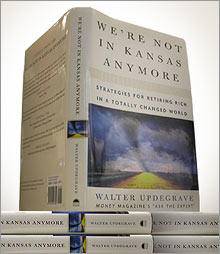|
|

|
|
More information on Updegrave's new book.
|
|
|
|
|
|
|
NEW YORK (CNN/Money) -
Can I invest my IRA money in real estate?
-- Chris Le Grand, Whitefish Bay, Wisconsin
You certainly can put real estate in your IRA. In fact, there's no legal prohibition against you investing your IRA money in anything from single-family homes to apartment buildings to raw land.
Question is, should you be doing this? I'd recommend against it.
The hassle factor
One reason is the hassle factor. To buy real estate for your IRA, you will have to find a custodian that allows real estate as an investment and that is set up to deal administratively with real estate as an IRA investment. That rules out most brokerage and mutual fund firms.
Even after you find a custodian that can deal with real estate, you've got some other complications to deal with. All expenses associated with the real estate you buy must flow through your IRA account. That means you must have enough cash in the account to handle things like property taxes, maintenance repairs, property management fees, etc.
There's also the question of acquiring the property. If you don't have enough money in your IRA to pay cash, that means you'll have to get financing. That can be difficult since an individual can't personally guarantee a loan to an IRA, which means you'll have to find a lender willing to finance on the basis of the property's cash flow alone.
I'm not saying these complications can't be overcome. They can. (Simply Googling real estate in IRA will turn up all sort of companies willing to act as custodians or otherwise help you stuff your IRA with real estate.)
But you'll be looking at a process that is time consuming, can involve many fees every step of the way and can result in substantial IRS penalties or even the disqualification of the tax-advantaged status of your IRA if you run afoul of the rules.
Hard to be well-diversified
But even if you're not put off by the hassles or the expense of investing your IRA money in real estate, I still doubt it would be a good move for most people. Why? Because most individuals don't own enough other retirement assets so that they can afford to invest in real estate and still maintain a diversified portfolio.
Think about it. Let's say you have $300,000 in total retirement savings, half of which is in your IRA and half in your 401(k). And let's assume you use the IRA money to buy a $150,000 single-family home that you'll rent out.
In terms of diversification, I think you've made a pretty bad move. You now not only have half of your retirement savings invested in one asset -- real estate -- you've got it invested in a single area and a single property. That's like putting all your money in the stock of one company. I consider that unacceptably risky.
You could lower your risk somewhat by owning properties in several different neighborhoods (or, better yet, several different cities). But let's be realistic. How many people would take the time and effort to do that and, would have IRA portfolios that are large enough to manage it even if they did?
Boom reaction
Bottom line: I see all this interest in real estate in general and for real estate in IRAs in particular as little more than a reaction to the house-price boom of recent years.
Much as investors saw tech stocks as their salvation in the late 1990s, investors today see real estate as the sure road to riches. I'm not predicting that real estate will meet the same fate, but the potential for a sobering setback is there. (For more on that, click here.)
If you really want some real estate in your IRA, I'd say you're much better off putting a small portion of your account -- say, 10 to 15 percent -- in mutual funds that invest in Real Estate Investment Trusts (REITs) and other real estate-related investments.
That way, you'll get your real estate exposure with less hassle, less expense and more diversification.
Walter Updegrave is a senior editor at MONEY Magazine and is the author of "We're Not in Kansas Anymore: Strategies for Retiring Rich in a Totally Changed World."

|